International Economics: Trade Theories
VerifiedAdded on 2020/05/04
|7
|1104
|57
AI Summary
This assignment delves into key principles of international economics, focusing on the theory of comparative advantage and economies of scale. It examines how comparative advantage drives specialization and gains from trade, contrasting it with the concept of absolute advantage. The assignment further analyzes the role of economies of scale in influencing international trade dynamics.
Contribute Materials
Your contribution can guide someone’s learning journey. Share your
documents today.
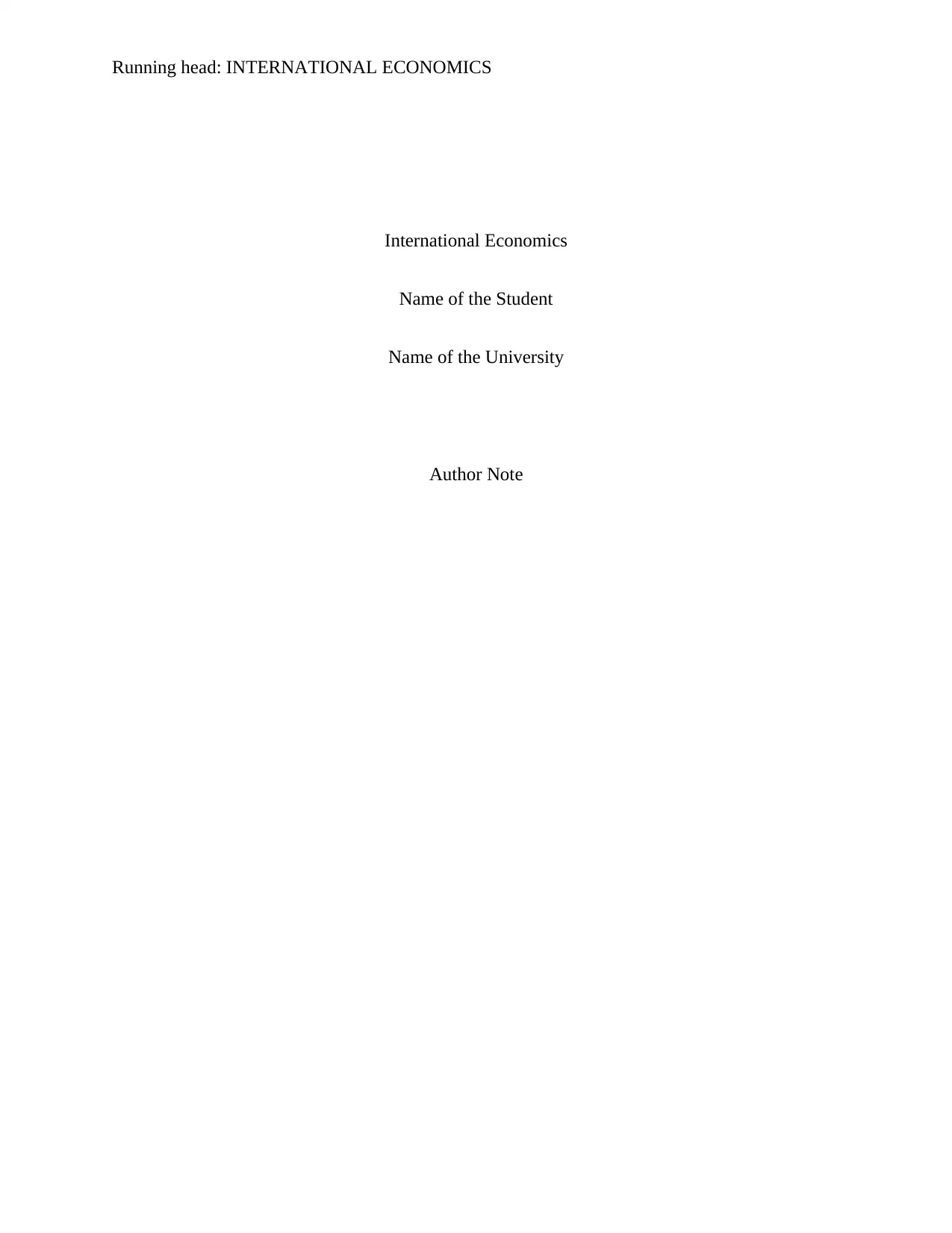
Running head: INTERNATIONAL ECONOMICS
International Economics
Name of the Student
Name of the University
Author Note
International Economics
Name of the Student
Name of the University
Author Note
Secure Best Marks with AI Grader
Need help grading? Try our AI Grader for instant feedback on your assignments.
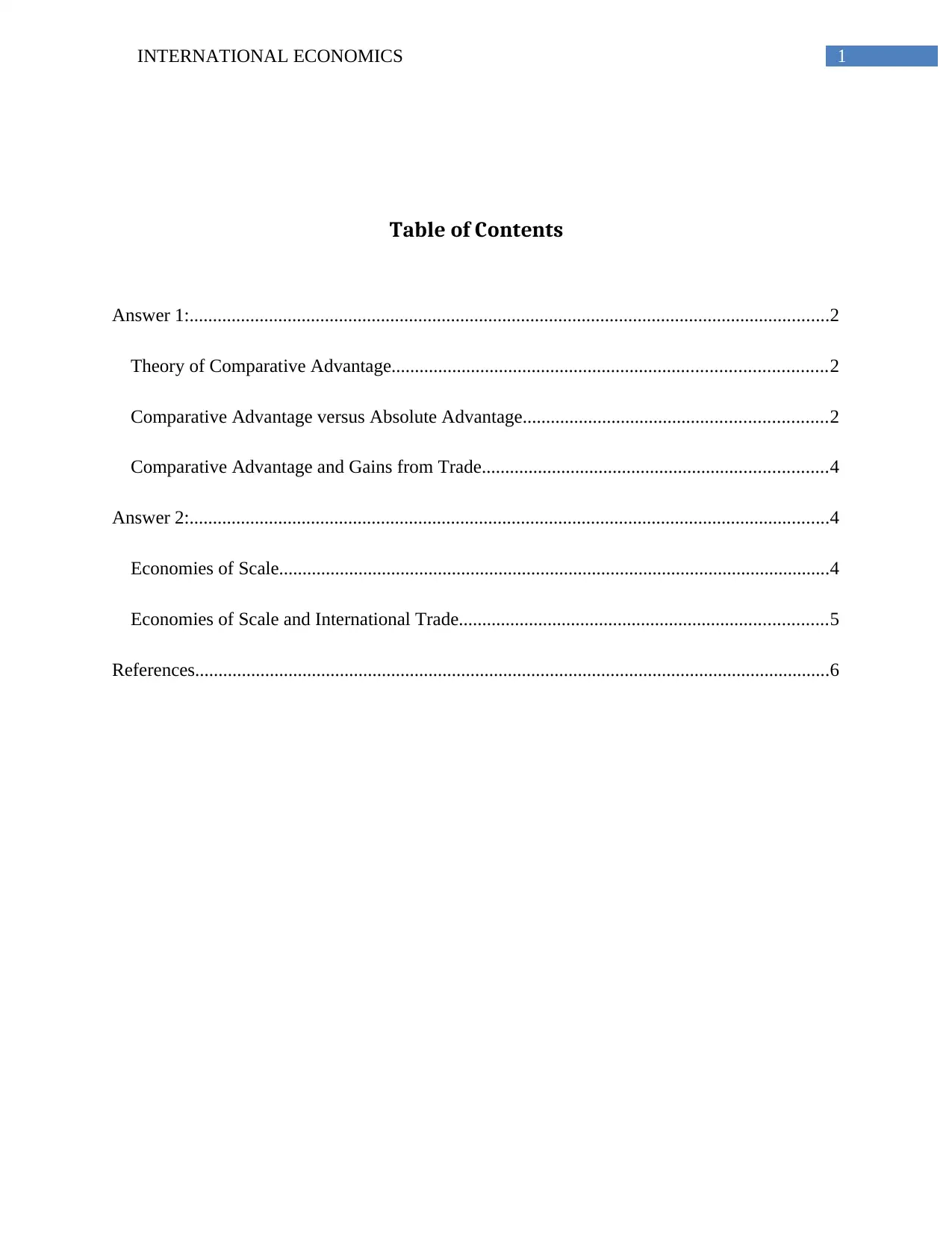
1INTERNATIONAL ECONOMICS
Table of Contents
Answer 1:.........................................................................................................................................2
Theory of Comparative Advantage.............................................................................................2
Comparative Advantage versus Absolute Advantage.................................................................2
Comparative Advantage and Gains from Trade..........................................................................4
Answer 2:.........................................................................................................................................4
Economies of Scale......................................................................................................................4
Economies of Scale and International Trade...............................................................................5
References........................................................................................................................................6
Table of Contents
Answer 1:.........................................................................................................................................2
Theory of Comparative Advantage.............................................................................................2
Comparative Advantage versus Absolute Advantage.................................................................2
Comparative Advantage and Gains from Trade..........................................................................4
Answer 2:.........................................................................................................................................4
Economies of Scale......................................................................................................................4
Economies of Scale and International Trade...............................................................................5
References........................................................................................................................................6
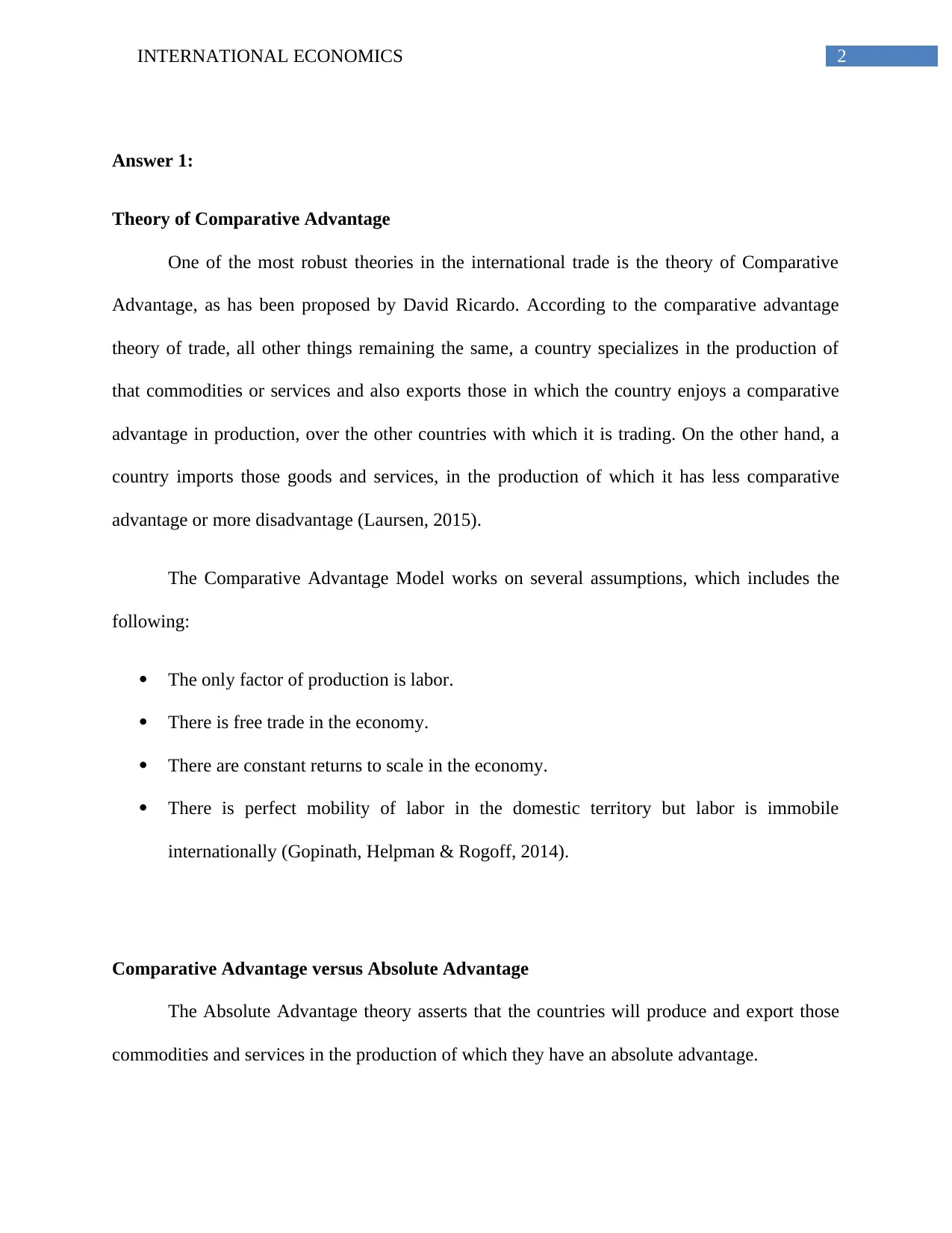
2INTERNATIONAL ECONOMICS
Answer 1:
Theory of Comparative Advantage
One of the most robust theories in the international trade is the theory of Comparative
Advantage, as has been proposed by David Ricardo. According to the comparative advantage
theory of trade, all other things remaining the same, a country specializes in the production of
that commodities or services and also exports those in which the country enjoys a comparative
advantage in production, over the other countries with which it is trading. On the other hand, a
country imports those goods and services, in the production of which it has less comparative
advantage or more disadvantage (Laursen, 2015).
The Comparative Advantage Model works on several assumptions, which includes the
following:
The only factor of production is labor.
There is free trade in the economy.
There are constant returns to scale in the economy.
There is perfect mobility of labor in the domestic territory but labor is immobile
internationally (Gopinath, Helpman & Rogoff, 2014).
Comparative Advantage versus Absolute Advantage
The Absolute Advantage theory asserts that the countries will produce and export those
commodities and services in the production of which they have an absolute advantage.
Answer 1:
Theory of Comparative Advantage
One of the most robust theories in the international trade is the theory of Comparative
Advantage, as has been proposed by David Ricardo. According to the comparative advantage
theory of trade, all other things remaining the same, a country specializes in the production of
that commodities or services and also exports those in which the country enjoys a comparative
advantage in production, over the other countries with which it is trading. On the other hand, a
country imports those goods and services, in the production of which it has less comparative
advantage or more disadvantage (Laursen, 2015).
The Comparative Advantage Model works on several assumptions, which includes the
following:
The only factor of production is labor.
There is free trade in the economy.
There are constant returns to scale in the economy.
There is perfect mobility of labor in the domestic territory but labor is immobile
internationally (Gopinath, Helpman & Rogoff, 2014).
Comparative Advantage versus Absolute Advantage
The Absolute Advantage theory asserts that the countries will produce and export those
commodities and services in the production of which they have an absolute advantage.
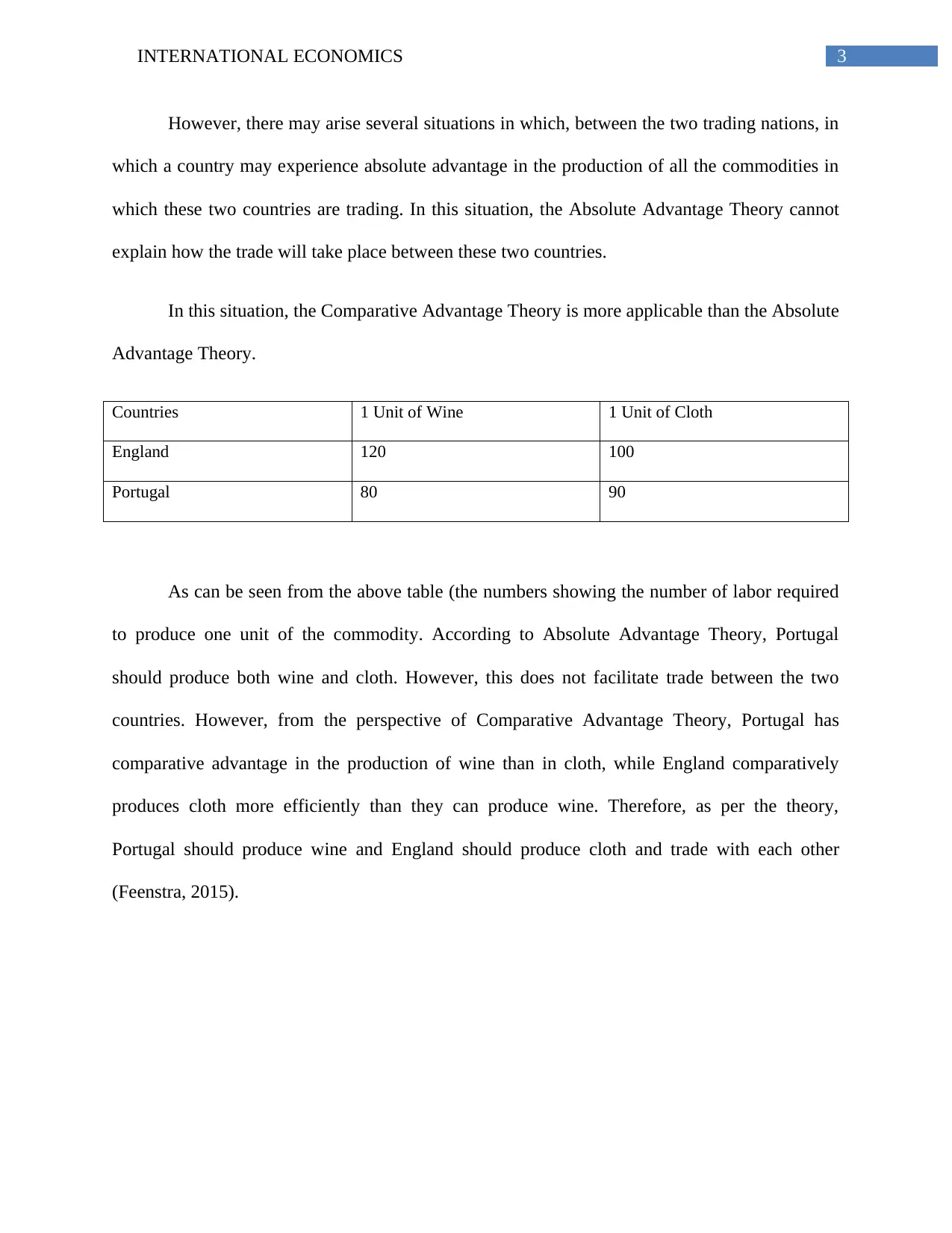
3INTERNATIONAL ECONOMICS
However, there may arise several situations in which, between the two trading nations, in
which a country may experience absolute advantage in the production of all the commodities in
which these two countries are trading. In this situation, the Absolute Advantage Theory cannot
explain how the trade will take place between these two countries.
In this situation, the Comparative Advantage Theory is more applicable than the Absolute
Advantage Theory.
Countries 1 Unit of Wine 1 Unit of Cloth
England 120 100
Portugal 80 90
As can be seen from the above table (the numbers showing the number of labor required
to produce one unit of the commodity. According to Absolute Advantage Theory, Portugal
should produce both wine and cloth. However, this does not facilitate trade between the two
countries. However, from the perspective of Comparative Advantage Theory, Portugal has
comparative advantage in the production of wine than in cloth, while England comparatively
produces cloth more efficiently than they can produce wine. Therefore, as per the theory,
Portugal should produce wine and England should produce cloth and trade with each other
(Feenstra, 2015).
However, there may arise several situations in which, between the two trading nations, in
which a country may experience absolute advantage in the production of all the commodities in
which these two countries are trading. In this situation, the Absolute Advantage Theory cannot
explain how the trade will take place between these two countries.
In this situation, the Comparative Advantage Theory is more applicable than the Absolute
Advantage Theory.
Countries 1 Unit of Wine 1 Unit of Cloth
England 120 100
Portugal 80 90
As can be seen from the above table (the numbers showing the number of labor required
to produce one unit of the commodity. According to Absolute Advantage Theory, Portugal
should produce both wine and cloth. However, this does not facilitate trade between the two
countries. However, from the perspective of Comparative Advantage Theory, Portugal has
comparative advantage in the production of wine than in cloth, while England comparatively
produces cloth more efficiently than they can produce wine. Therefore, as per the theory,
Portugal should produce wine and England should produce cloth and trade with each other
(Feenstra, 2015).
Secure Best Marks with AI Grader
Need help grading? Try our AI Grader for instant feedback on your assignments.
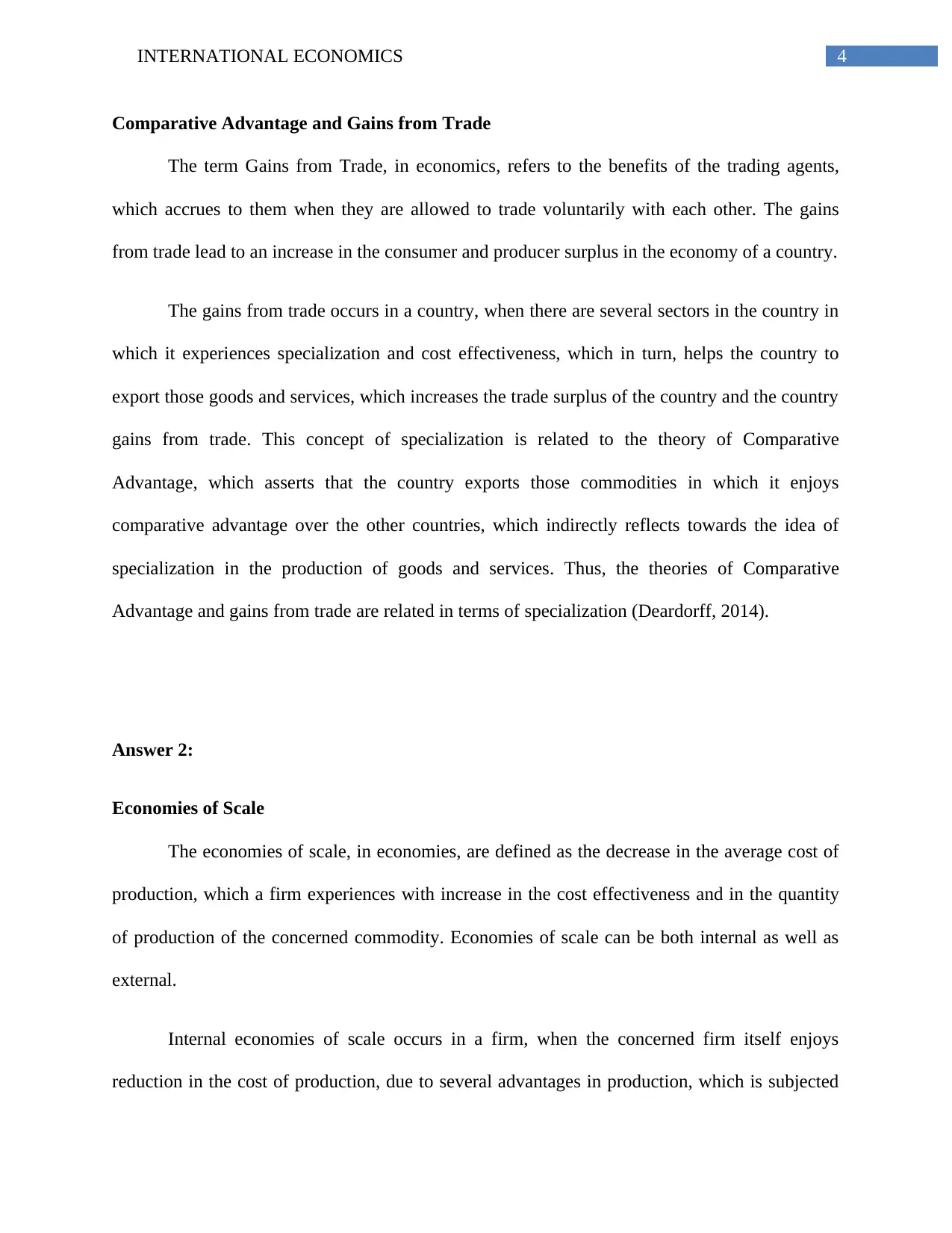
4INTERNATIONAL ECONOMICS
Comparative Advantage and Gains from Trade
The term Gains from Trade, in economics, refers to the benefits of the trading agents,
which accrues to them when they are allowed to trade voluntarily with each other. The gains
from trade lead to an increase in the consumer and producer surplus in the economy of a country.
The gains from trade occurs in a country, when there are several sectors in the country in
which it experiences specialization and cost effectiveness, which in turn, helps the country to
export those goods and services, which increases the trade surplus of the country and the country
gains from trade. This concept of specialization is related to the theory of Comparative
Advantage, which asserts that the country exports those commodities in which it enjoys
comparative advantage over the other countries, which indirectly reflects towards the idea of
specialization in the production of goods and services. Thus, the theories of Comparative
Advantage and gains from trade are related in terms of specialization (Deardorff, 2014).
Answer 2:
Economies of Scale
The economies of scale, in economies, are defined as the decrease in the average cost of
production, which a firm experiences with increase in the cost effectiveness and in the quantity
of production of the concerned commodity. Economies of scale can be both internal as well as
external.
Internal economies of scale occurs in a firm, when the concerned firm itself enjoys
reduction in the cost of production, due to several advantages in production, which is subjected
Comparative Advantage and Gains from Trade
The term Gains from Trade, in economics, refers to the benefits of the trading agents,
which accrues to them when they are allowed to trade voluntarily with each other. The gains
from trade lead to an increase in the consumer and producer surplus in the economy of a country.
The gains from trade occurs in a country, when there are several sectors in the country in
which it experiences specialization and cost effectiveness, which in turn, helps the country to
export those goods and services, which increases the trade surplus of the country and the country
gains from trade. This concept of specialization is related to the theory of Comparative
Advantage, which asserts that the country exports those commodities in which it enjoys
comparative advantage over the other countries, which indirectly reflects towards the idea of
specialization in the production of goods and services. Thus, the theories of Comparative
Advantage and gains from trade are related in terms of specialization (Deardorff, 2014).
Answer 2:
Economies of Scale
The economies of scale, in economies, are defined as the decrease in the average cost of
production, which a firm experiences with increase in the cost effectiveness and in the quantity
of production of the concerned commodity. Economies of scale can be both internal as well as
external.
Internal economies of scale occurs in a firm, when the concerned firm itself enjoys
reduction in the cost of production, due to several advantages in production, which is subjected
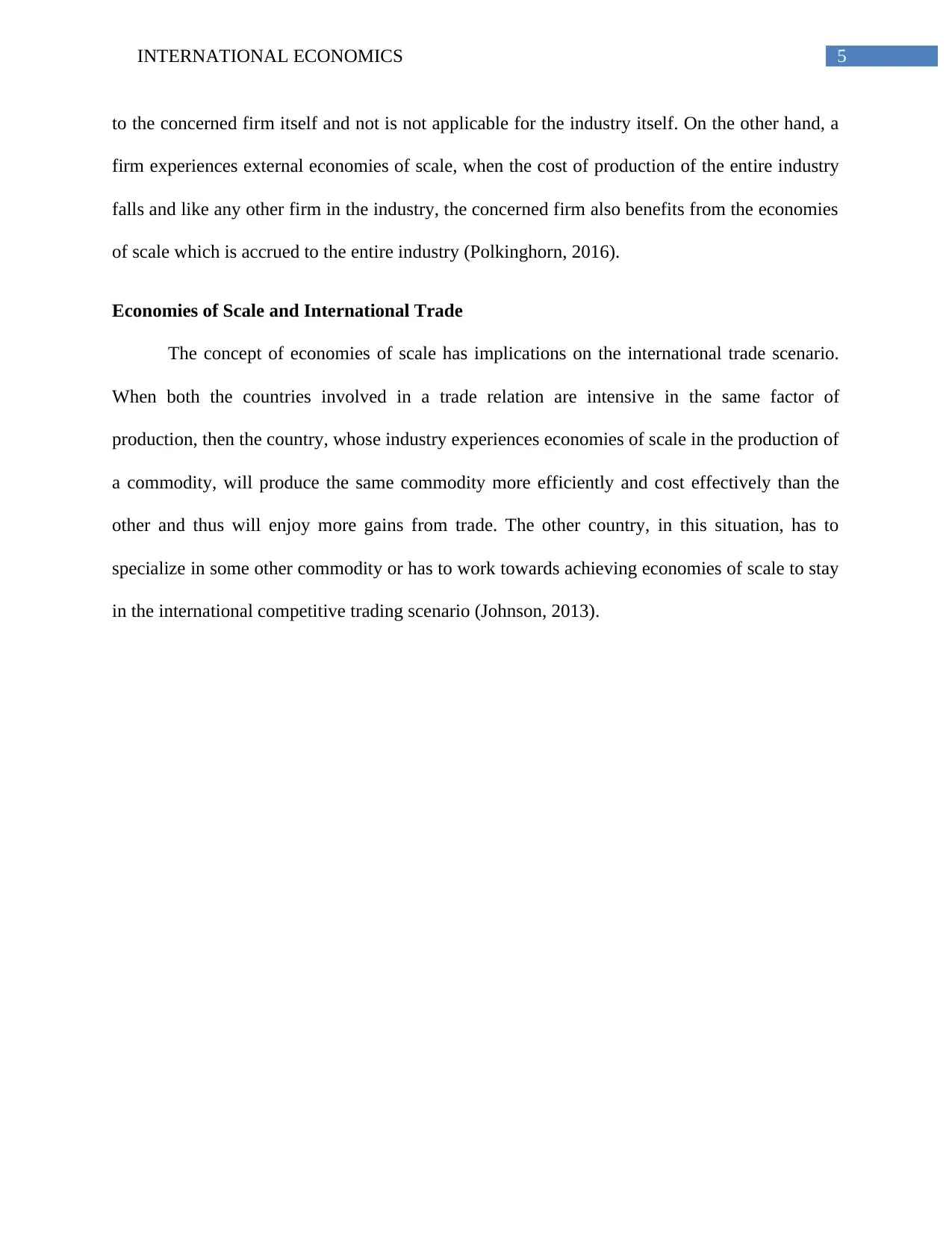
5INTERNATIONAL ECONOMICS
to the concerned firm itself and not is not applicable for the industry itself. On the other hand, a
firm experiences external economies of scale, when the cost of production of the entire industry
falls and like any other firm in the industry, the concerned firm also benefits from the economies
of scale which is accrued to the entire industry (Polkinghorn, 2016).
Economies of Scale and International Trade
The concept of economies of scale has implications on the international trade scenario.
When both the countries involved in a trade relation are intensive in the same factor of
production, then the country, whose industry experiences economies of scale in the production of
a commodity, will produce the same commodity more efficiently and cost effectively than the
other and thus will enjoy more gains from trade. The other country, in this situation, has to
specialize in some other commodity or has to work towards achieving economies of scale to stay
in the international competitive trading scenario (Johnson, 2013).
to the concerned firm itself and not is not applicable for the industry itself. On the other hand, a
firm experiences external economies of scale, when the cost of production of the entire industry
falls and like any other firm in the industry, the concerned firm also benefits from the economies
of scale which is accrued to the entire industry (Polkinghorn, 2016).
Economies of Scale and International Trade
The concept of economies of scale has implications on the international trade scenario.
When both the countries involved in a trade relation are intensive in the same factor of
production, then the country, whose industry experiences economies of scale in the production of
a commodity, will produce the same commodity more efficiently and cost effectively than the
other and thus will enjoy more gains from trade. The other country, in this situation, has to
specialize in some other commodity or has to work towards achieving economies of scale to stay
in the international competitive trading scenario (Johnson, 2013).
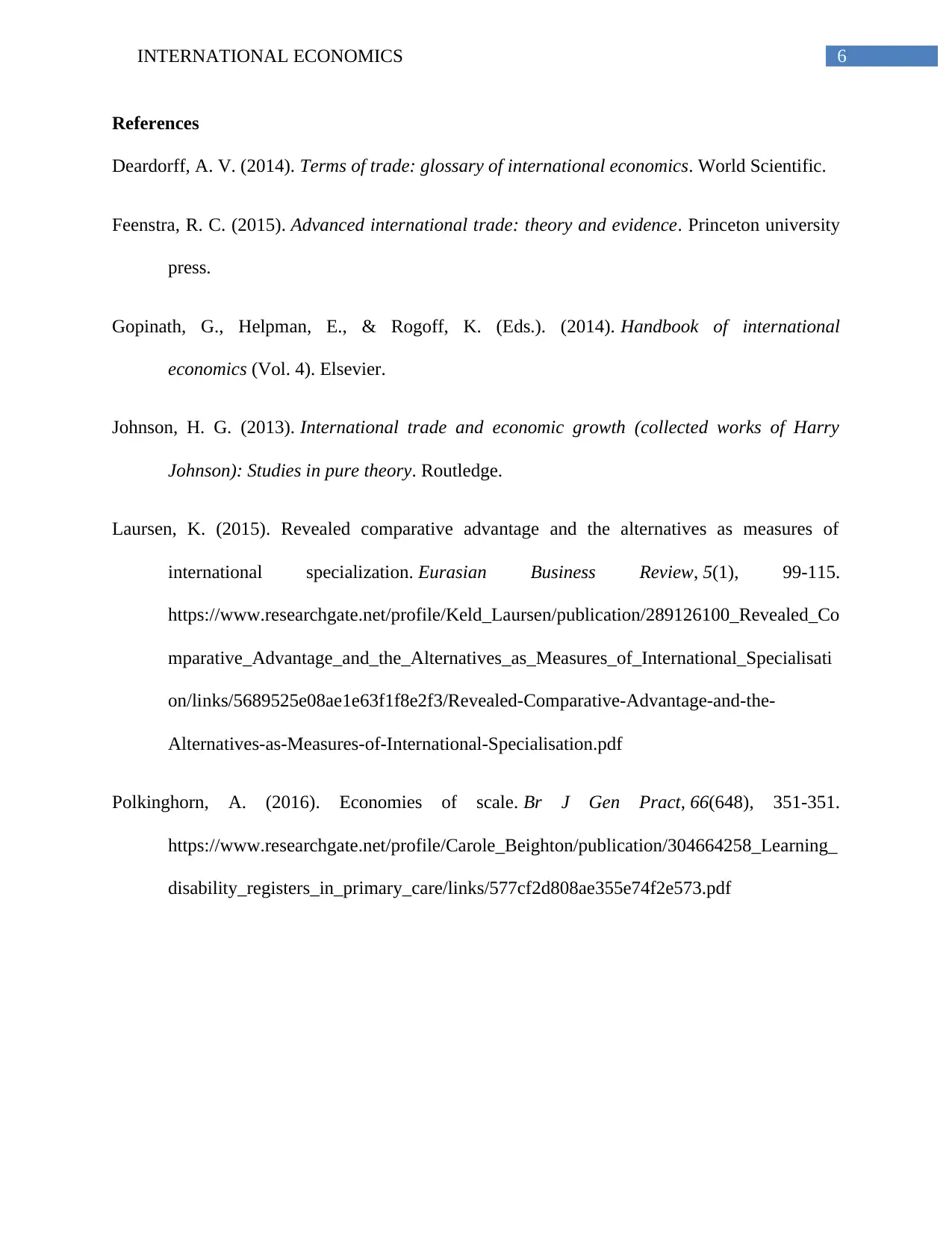
6INTERNATIONAL ECONOMICS
References
Deardorff, A. V. (2014). Terms of trade: glossary of international economics. World Scientific.
Feenstra, R. C. (2015). Advanced international trade: theory and evidence. Princeton university
press.
Gopinath, G., Helpman, E., & Rogoff, K. (Eds.). (2014). Handbook of international
economics (Vol. 4). Elsevier.
Johnson, H. G. (2013). International trade and economic growth (collected works of Harry
Johnson): Studies in pure theory. Routledge.
Laursen, K. (2015). Revealed comparative advantage and the alternatives as measures of
international specialization. Eurasian Business Review, 5(1), 99-115.
https://www.researchgate.net/profile/Keld_Laursen/publication/289126100_Revealed_Co
mparative_Advantage_and_the_Alternatives_as_Measures_of_International_Specialisati
on/links/5689525e08ae1e63f1f8e2f3/Revealed-Comparative-Advantage-and-the-
Alternatives-as-Measures-of-International-Specialisation.pdf
Polkinghorn, A. (2016). Economies of scale. Br J Gen Pract, 66(648), 351-351.
https://www.researchgate.net/profile/Carole_Beighton/publication/304664258_Learning_
disability_registers_in_primary_care/links/577cf2d808ae355e74f2e573.pdf
References
Deardorff, A. V. (2014). Terms of trade: glossary of international economics. World Scientific.
Feenstra, R. C. (2015). Advanced international trade: theory and evidence. Princeton university
press.
Gopinath, G., Helpman, E., & Rogoff, K. (Eds.). (2014). Handbook of international
economics (Vol. 4). Elsevier.
Johnson, H. G. (2013). International trade and economic growth (collected works of Harry
Johnson): Studies in pure theory. Routledge.
Laursen, K. (2015). Revealed comparative advantage and the alternatives as measures of
international specialization. Eurasian Business Review, 5(1), 99-115.
https://www.researchgate.net/profile/Keld_Laursen/publication/289126100_Revealed_Co
mparative_Advantage_and_the_Alternatives_as_Measures_of_International_Specialisati
on/links/5689525e08ae1e63f1f8e2f3/Revealed-Comparative-Advantage-and-the-
Alternatives-as-Measures-of-International-Specialisation.pdf
Polkinghorn, A. (2016). Economies of scale. Br J Gen Pract, 66(648), 351-351.
https://www.researchgate.net/profile/Carole_Beighton/publication/304664258_Learning_
disability_registers_in_primary_care/links/577cf2d808ae355e74f2e573.pdf
1 out of 7
Related Documents
Your All-in-One AI-Powered Toolkit for Academic Success.
+13062052269
info@desklib.com
Available 24*7 on WhatsApp / Email
![[object Object]](/_next/static/media/star-bottom.7253800d.svg)
Unlock your academic potential
© 2024 | Zucol Services PVT LTD | All rights reserved.




